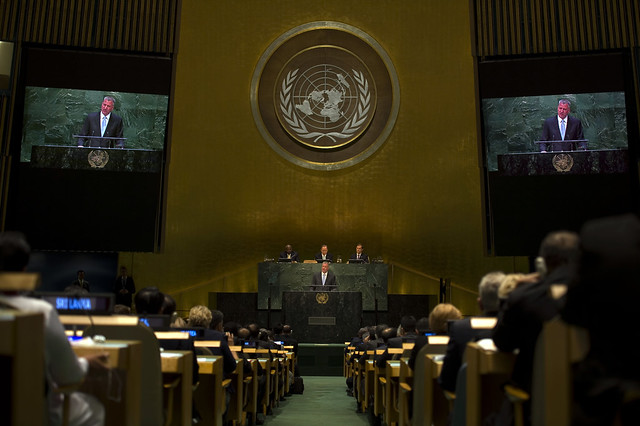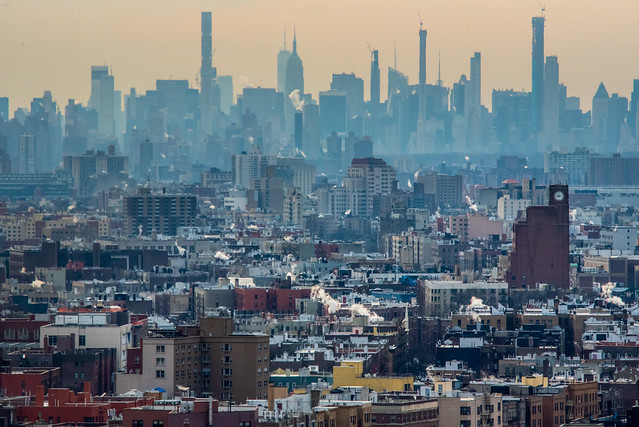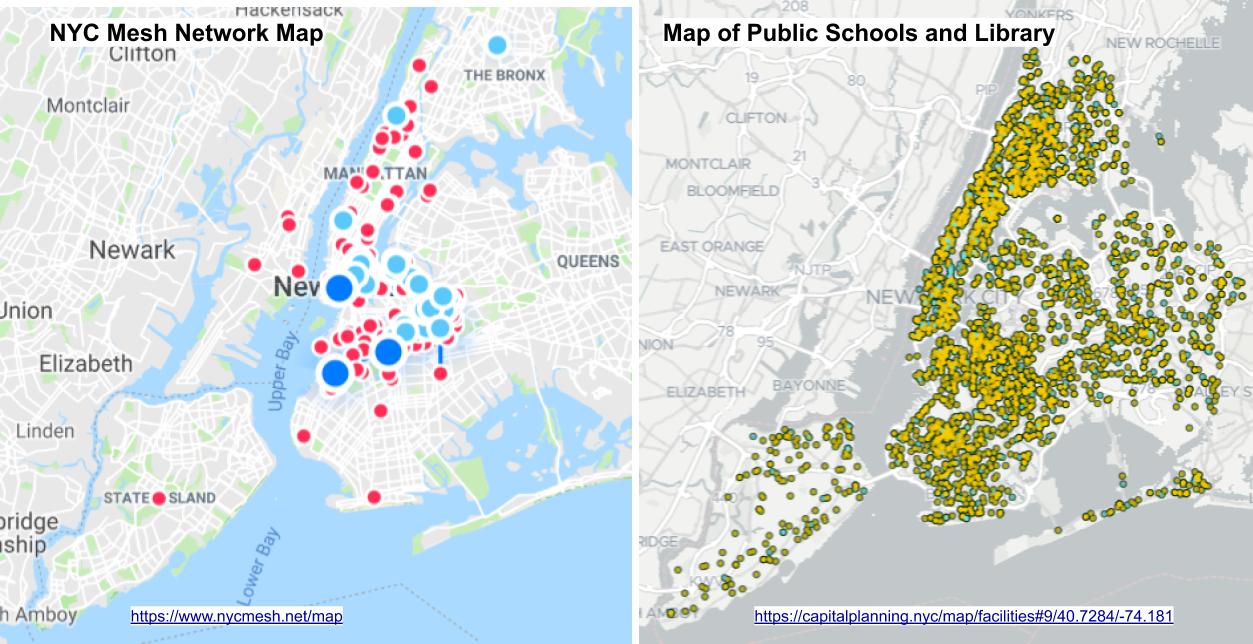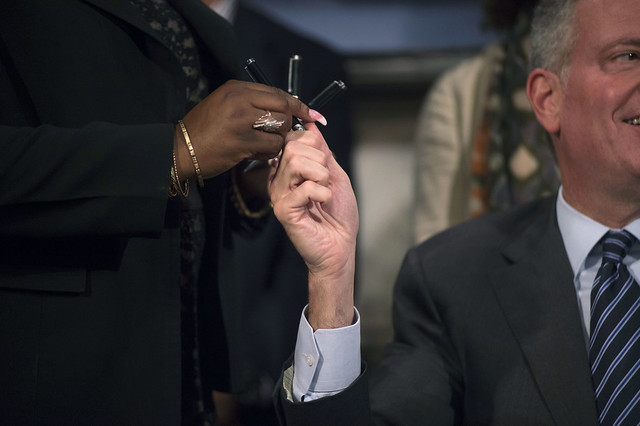Hosting the United Nations Brings Real Value to New Yorkers

(photo: Rob Bennett/Mayor's Office)
For many New Yorkers, the annual wave of United Nations events, set to start again this week, can be a nightmare: jam-packed subways, bottlenecks on the FDR Drive, and crowded sidewalks that slow our steady gait to a maddening crawl.
What most New Yorkers may not realize, however, is that hosting the UN boosts our economy, draws desirable traffic to local businesses, and elevates city diplomacy on the world stage — and that’s a boon for all of us.
Since 1946, New York City has been the proud, permanent home to the UN and its promise to make the world a better, more peaceful place. We play host to 193 Permanent Missions, over 70 trade missions and 116 consulates – the largest diplomatic community in the world.
With one in three New Yorkers being foreign born and over 200 languages spoken throughout the five boroughs, our city naturally has a special connection to the UN’s member states. Thanks to this enduring bond, New Yorkers actually have a voice on global issues such as human rights, migration, and climate change. We are stalwarts of the UN’s mission to protect and serve a thriving, fair, and just world nation.
The fact is, with record low unemployment, our city has never been more prosperous and the UN community has been part of that success. The UN Headquarters has contributed $3.69 billion to our city’s economy and created thousands of jobs for New Yorkers, according to a 2016 report by the Mayor’s Office of International Affairs and the New York City Economic Development Corporation.
The United Nations is much more than the sum of its economic impact, of course. New York City is living out the mission to achieve the UN’s Sustainable Development Goals (SDGs or Global Goals) by 2030. First launched in 2015, these global targets for fighting poverty, promoting health, and protecting the environment are crucial to all of our futures. The Mayor’s Office for International Affairs has been using the Global Goals framework to showcase our city’s innovations in sustainability with cities and countries around the world.
The global community looks to the U.S. for sound public policy and New York City is leading the way. We’ve learned a lot from other nations as well; innovations in climate, gender equity, and education aren’t limited by borders.
Our children are also benefiting from our international ties. With the support of other city agencies, and in partnership with the United Nations, the Mayor’s Office for International Affairs runs the award-winning Junior Ambassadors program. Over the last four years, thousands of young New Yorkers from across our city have gotten a firsthand look at global politics and learned how they can live out the Global Goals in their own communities.
So congestion and street closures aside, it’s important to stay focused on what truly matters: that when it comes to the local economy and our standing with communities across the globe, the United Nations is good for all of New York City.
***
Penny Abeywardena is New York City Commissioner for International Affairs. On Twitter @PAbeywardena & @GlobalNYC.
***
Have an op-ed idea or submission for Gotham Gazette? Email This email address is being protected from spambots. You need JavaScript enabled to view it.
Community WiFi is Already Here, Now It's Time to Expand It

(photo: Michael Appleton/Mayor's Office )
While politicians and industry focus on 5G wireless, the democratization of more common wireless technology has quietly made community-run wifi networks faster, better and cheaper than cable.
Look for wifi anywhere in New York City and you’ll likely find dozens of locked networks, each of which represents (more or less) someone giving a giant consumer internet company like Verizon, Spectrum, or Optimum around a thousand dollars a year. For years, technologists have dreamed of replacing these individual networks with community-run “mesh networks” that would allow people to share fast, secure connections while paying a fraction of the cost of conventional internet service providers.
This dream has, unfortunately, not turned into a reality for the vast majority of New Yorkers, and there are reasons for that.
The cable companies don’t want us to share our online connections because they’d lose a LOT of money -- billions and billions of dollars -- so their consumer internet contracts make sharing illegal. The manufacturers of consumer wifi routers don’t want us to share either, so they don’t make it easy to link routers together in a convenient way for multi-unit wifi sharing. And so, if you think like an internet consumer, efficient wifi sharing just isn’t practical. But if you think like an internet producer, the view begins to change.
Believe it or not, the internet is not a private club that only Optimum, Verizon, and the other consumer internet service providers (ISPs) allow us to access. It’s more like a water system. Consumer ISPs set up plumbing to get wifi (water) from the internet’s “backbone” (think water main) to your house, usually using the same coaxial cable that they laid down to offer cable TV decades ago, and now newer fiber connections.
But others can also build that plumbing.
NYC Mesh is a community-owned and managed internet network committed to creating a more equitable internet by connecting all New Yorkers to high-speed, affordable broadband. To achieve this, NYC Mesh volunteers have collectively built the plumbing needed to take the internet from the “backbone” to the surface, and are now using newly inexpensive wireless radios to move it from rooftop to rooftop, window sill to window sill, to create fast and free community-run wireless networks.
A few years ago NYC Mesh was relatively slow, but thanks to the massive improvements in inexpensive radio technologies, they can now offer speeds comparable to traditional commercial offerings.
So what does that mean? Instead of paying $80/month ($960/year) or more to your cable company, you could connect to NYC Mesh with a $100 radio antenna and get free internet. They request donations of $20/month ($340/year) to keep the shared network running and to help connect the nearly 30% of New Yorkers currently without an internet connection at home. With that donation, subscribers still be saving over $500/year while helping to grow the physical and social infrastructure of a new way to connect online.
There is, of course, a catch -- at least for now. You can only access NYC Mesh if you can point a radio at one of their radios, and their radios currently cover only a small fraction of the city: mostly the east side of lower Manhattan, Chinatown, Williamsburg, Bedford Stuyvesant, Bushwick, Brownsville, Sunset Park, South Slope, Park Slope, Red Hook, Ridewood, and parts of Crown Heights. And even if you live in those neighborhoods, unless you can get a radio on your roof, you might not be able to connect. But the network is constantly growing as new wireless hubs come online every week, so it's likely that it’ll be easy to connect to it in the next few years if you can’t now.
What the network needs most to grow is rooftops where 5-10 foot poles and $240 radios can be placed. If more rooftops were made available, the entire city could be blanketed from the streets to the rooftop in self-organized, self-funded NYC Mesh.

NYC Mesh doesn’t need government money to grow, but it could definitely use government roof tops. New York City’s government has a lot of them. If the city would make rooftop space on its nearly 4,000 public schools and libraries accessible to NYC Mesh, and/or NYCHA would allow rooftop access with agreements to connect residents, then the network could quickly grow citywide.
If New York City had a robust, community-funded, voluntarily-organized network, it would give the city and its residents a significantly stronger negotiating position when dealing with the cable companies, resulting in significant cost savings for everyone.
Grassroots movements like NYC Mesh aren’t waiting for “the city” to act. They’re already working with individual agencies, community organizations, elected officials, and anyone else with an interest in deploying fast and free wifi to where it’s needed most. Manhattan Borough President Gale Brewer, in collaboration with BetaNYC and (my nonprofit) Sarapis, has a demonstration of NYC Mesh technology at her office at the David Dinkins Municipal Building. Her office’s system, which I and other volunteers helped set up, is achieving gigabit speeds and beaming wifi down to City Hall Park and toward City Council and agency staff at 120 Broadway who often complain about their sluggish internet connections.
So, New Yorkers! Consider this your invitation to fast, free wifi. RSVP here.
***
Devin Balkind is a nonprofit executive, civic technologist, and startup advisor running for Public Advocate as the Libertarian Party nominee. On Twitter @DevinBalkind.
***
Have an op-ed idea or submission for Gotham Gazette? Email This email address is being protected from spambots. You need JavaScript enabled to view it.
The Mayor's Missing Pen

(photo: Ed Reed/Mayor's Office)
Many New Yorkers are expressing frustration at Mayor Bill de Blasio’s lack of attention to his job as he travels around the country campaigning for president. But his laid-back attitude toward the mayoralty manifested itself long before he announced his presidential candidacy.
One particularly illustrative and significant aspect of the job that he has neglected is his role in the legislative process.
First, a quick refresher on how, pursuant to the City Charter, a bill becomes a law in New York City:
-If passed by a majority of the City Council, it is sent to the mayor, who signs the bill into law.
-If the mayor takes no action within 30 days of receipt, the bill automatically becomes law without a mayoral signature (“lapses” into law).
-If during the requisite period the mayor vetoes a bill, the veto can be overridden by a vote of two-thirds of the Council and it then becomes law without further action by the mayor. (City Charter Section 37)
The potential of a mayoral veto, even if it can be overridden, creates a healthy tension that serves as a check on overreach by the Council. By the same token, the potential of a veto override by the Council restrains the mayor from excessive use of the veto pen to block legislation that has widespread support. Thus, the process established in the City Charter creates a checks-and-balances relationship between the executive and legislative branches and requires a level of engagement by both branches in the adoption of new laws.
But in his more than five-and-a-half years as mayor, de Blasio has not vetoed a single bill of the more than 1,000 adopted by the City Council during his time in office. He has not even publicly threatened to veto a bill as an expression of his dissatisfaction with any single one of the barrage of bills that have been introduced (and enacted) during that time.
In contrast, during his three terms in office, Michael Bloomberg vetoed and was overridden on 70 bills out of the total of 987 passed by the Council.
When asked about not vetoing any bills the mayor’s response has been that his team negotiates and helps craft virtually all the adopted bills. There are some high-profile examples, especially related to the NYPD, e.g. the Criminal Justice Reform Act. He would probably also argue that the administration has been able to deter certain legislation, such as the bill to criminalize police chokeholds and the Small Business Jobs Act, though it's not clear if it's the administration or the Council speaker’s office that has been most responsible for sidetracking certain bills. But even in the Bloomberg years, when the mayor and Council speaker were clearly working hand in glove, there were still some vetoes.
Moreover, if de Blasio has played a key role in shaping so much legislation, it is difficult to explain why he has allowed the vast majority of bills passed during his terms to become law without his signature by letting the 30-day time period expire with no action on his part. Wouldn’t he want to associate himself with and take credit for all of the bills he helped shape by signing them into law?
The number of unsigned laws that have lapsed into law has grown from 5 out of 62 adopted in 2014 to a whopping 177 out of 223 passed in 2018.
Of the 156 bills passed by the Council so far in 2019 (as of August 23) the mayor signed only four! By comparison, Bloomberg signed all but 40 of the bills passed during his three terms.
Meanwhile, it is important to ask: haven’t there been cases in which city commissioners hired by the mayor have been opposed to Council bills (whether or not they’ve been allowed to state their dissatisfaction publicly) that they feel are unduly intrusive, costly or burdensome?
For example, surely some of the 845 reports required of city government entities, many through Council legislation, are regarded as inappropriate or unnecessary by agency heads, yet there has been no pushback by the mayor against these requirements when new ones have been added during his tenure.
Not only is this laissez-faire approach bad for morale among agency leaders, but it encourages Council members to introduce legislation on anything and everything because, well, why not? From 2014-2017, during 40 months of legislative session, 1,540 bills were introduced in the City Council; it has taken only 16 months since the 2018 session began to hit the same number of new bills. This volume of legislation is unprecedented.
Is it the case that there is a much more pressing need for City Council legislation now than there has ever been before? Or has the hands-off approach to the legislative process by this mayor led to an aggressive and “anything goes” spirit among Council members?
Let us hope that after the mayor drops out of the presidential race he will give more time and attention to exerting a restraining influence on the proliferation of proposed bills and local laws.
***
Carol Kellermann was president of Citizens Budget Commission from 2008 through 2018.
***
Have an op-ed idea or submission for Gotham Gazette? Email This email address is being protected from spambots. You need JavaScript enabled to view it.




